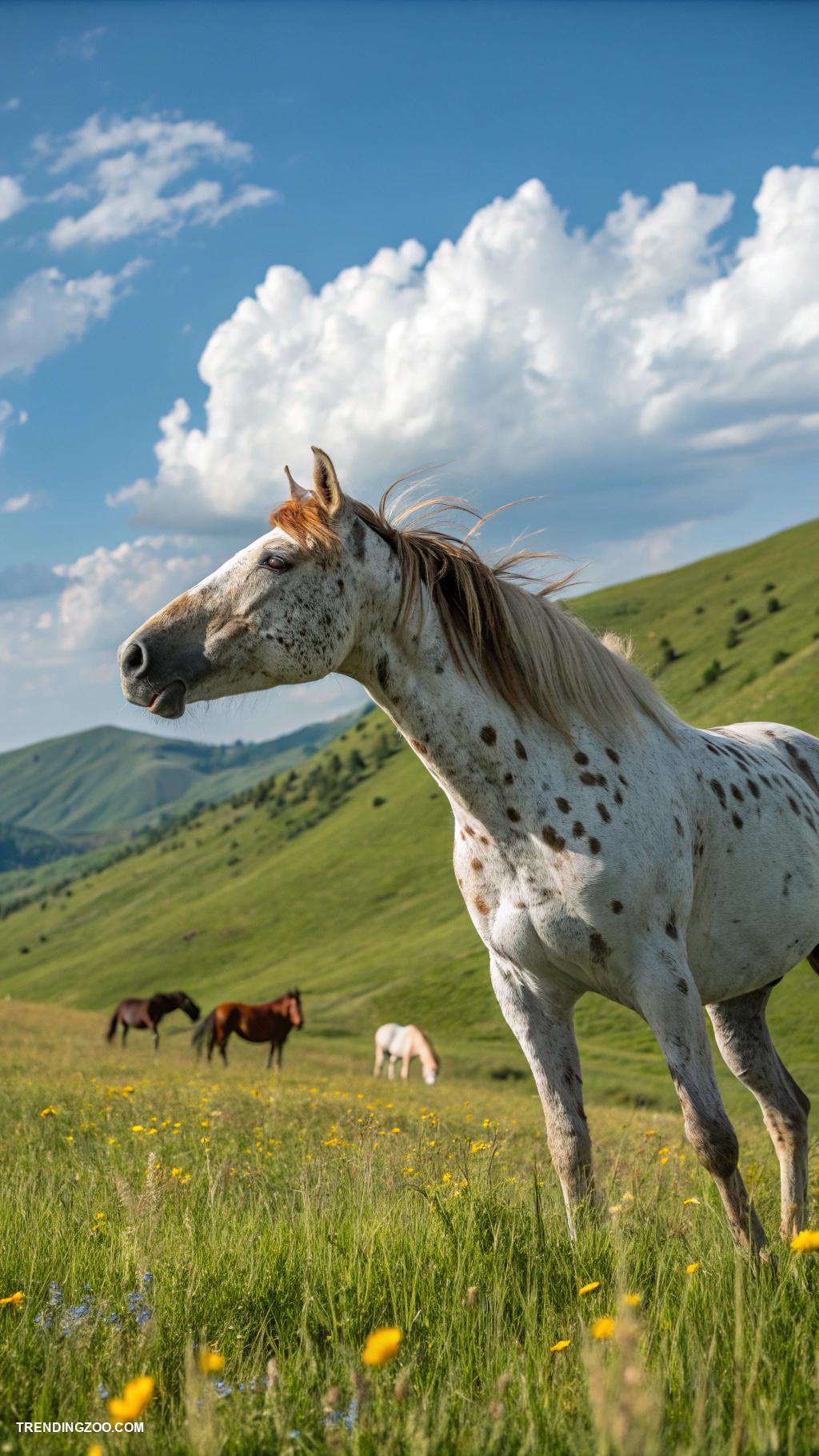The majestic Appaloosa horse – a breed known for its striking coat pattern and athletic prowess. With its rich history dating back to the 18th century, the Appaloosa has captivated horse enthusiasts and animal lovers alike with its unique appearance and impressive abilities. From its origins as a versatile workhorse to its modern-day popularity as a competitive trail and endurance mount, the Appaloosa has proven itself to be a loyal and hardworking companion.
But what makes this breed so special, and why are they such a popular choice for horse owners around the world? In this article, we’ll delve into the world of Appaloosas, exploring their history, characteristics, and what makes them such beloved pets.
History of the Appaloosa Horse
The Appaloosa horse has a rich and fascinating history that spans centuries. Originating in the Pacific Northwest region of North America, the breed is believed to have descended from horses brought to the continent by Spanish conquistadors in the 16th century. These early horses were crossed with native mustangs and other breeds, resulting in a unique and distinctive type of horse.
The Appaloosa was highly valued by Native American tribes, who used them for transportation, hunting, and warfare. In fact, the Nez Perce tribe, which was particularly fond of the breed, developed a specific type of Appaloosa known as the “Nez Perce Horse” that was renowned for its strength, agility, and striking appearance. The Appaloosa’s popularity continued to grow throughout the 19th century, with many settlers and ranchers in the western United States breeding and training them for use on their farms and ranches.
Despite facing challenges and decline in the early 20th century, the Appaloosa was eventually recognized as a distinct breed by the American Appaloosa Association in 1938, and today it is one of the most beloved and recognizable breeds in the world.
Physical Characteristics of Appaloosa Horses
Appaloosa horses are renowned for their distinctive physical characteristics, which set them apart from other breeds. One of the most striking features of the Appaloosa is its coat pattern, which typically consists of a mix of white and dark colors, often in a spotted or speckled pattern. The exact pattern can vary greatly from horse to horse, with some having a more subtle appearance while others are more boldly marked. The Appaloosa’s coat pattern is the result of a genetic condition known as “leopard complex,” which affects the production of melanin, the pigment responsible for hair and skin color.
In addition to its striking coat pattern, the Appaloosa is also known for its athletic build, with a strong, muscular body and a distinctive “roach” back, which is characterized by a pronounced curvature of the spine. The breed’s head is typically refined and refined, with large, expressive eyes and a straight or slightly convex profile. On average, Appaloosas stand between 14.2 and 16 hands high at the withers, making them a versatile and agile breed that excels in a variety of disciplines, from trail riding to competitive reining and jumping. Overall, the Appaloosa’s unique physical characteristics are a key part of its enduring popularity and
Temperament and Behavior
Appaloosa horses are known for their unique coat patterns and striking appearance, but they are also recognized for their gentle and friendly temperament. As a breed, Appaloosas are often described as calm, laid-back, and even-tempered, making them an excellent choice for riders of all experience levels. They are also known for their intelligence and willing nature, which makes them highly trainable. In fact, Appaloosas are often used in therapeutic riding programs and other equine-assisted activities due to their gentle and forgiving nature.
When it comes to behavior, Appaloosas are generally quiet and easy-going, with a tendency to be more curious than energetic. They are not prone to anxiety or fear-based behaviors, and they tend to adapt well to new environments and situations. With proper socialization and training, Appaloosas can make excellent companions for families, beginners, and experienced riders alike.
Overall, their temperament and behavior make them a beloved breed among horse enthusiasts, and their unique characteristics have earned them a special place in the hearts of many horse owners and riders.
Care and Maintenance of Appaloosa Horses
The Appaloosa horse, with its striking coat pattern and athletic build, demands regular care and maintenance to thrive. A key aspect of their care is grooming, which should be done daily to remove dirt, tangles, and mats from their mane, tail, and coat. A soft-bristled brush is ideal for this task, and it’s essential to be gentle around the eyes and ears.
Regular trimming of their hooves is crucial to prevent cracking and laminitis. It’s recommended to trim the hooves every four to six weeks, depending on the horse’s lifestyle and activity level. Another important aspect of care is dental care, as Appaloosas are prone to dental problems. Regular dental floatation and examination by a veterinarian can help prevent issues such as tooth decay and gum disease.
Providing a balanced diet that meets their nutritional needs is vital. Appaloosas are sensitive to certain grains and may require a specialized diet. It’s also essential to ensure they have access to fresh water at all times.
Regular exercise and mental stimulation are also crucial for their overall well-being, and they thrive on activities such as trail riding, agility training, and groundwork. Finally, providing a clean and safe living environment is essential, including a dry and well-vent
Training an Appaloosa Horse
Training an Appaloosa horse requires patience, consistency, and positive reinforcement. From an early age, it’s essential to establish a strong bond between you and your horse, based on trust, respect, and clear communication. Start with basic handling and grooming techniques, such as picking hooves, brushing, and halter breaking, to help your Appaloosa feel comfortable and confident around you.
As your horse grows and matures, you can gradually introduce more advanced training exercises, such as leading, backing, and basic obedience commands. Be sure to use positive reinforcement techniques, like treats and praise, to encourage good behavior and avoid punishment or negative reinforcement.
Appaloosas are known for their intelligence, athleticism, and strong instincts, so it’s crucial to provide mental and physical stimulation through training and exercise to keep them engaged and happy. With time, consistency, and the right approach, you can develop a strong partnership with your Appaloosa and enjoy a lifetime of rewarding experiences together.
Common Uses of Appaloosa Horses
Appaloosa horses are a versatile breed that can excel in a variety of disciplines, making them a popular choice among equestrians. One of the most common uses of Appaloosas is as a trail horse. Their calm and gentle nature, combined with their intelligence and agility, makes them well-suited for navigating rugged terrain and exploring the great outdoors.
Many Appaloosas are also used for competitive trail riding, where they are judged on their ability to complete challenging courses and navigate obstacles while maintaining a smooth and comfortable ride for their rider.
Appaloosas are often used for therapeutic riding programs, where their gentle and calm demeanor makes them an excellent choice for working with children and adults with physical or emotional disabilities.
Health Considerations for Appaloosa Horses
As a popular breed, Appaloosa horses require careful attention to their health to ensure they live long, happy, and healthy lives. One of the most significant health considerations for Appaloosas is the risk of congenital deafness, which is a common inherited trait in the breed. This condition can be identified through a hearing test, and affected horses should not be bred.
Appaloosas are prone to certain eye problems, including cataracts, progressive retinal atrophy, and keratoconjunctivitis sicca, or dry eye. Regular eye exams are crucial to detect these issues early on, and prompt treatment can help manage symptoms. Another important consideration is the risk of insulin resistance, which can lead to laminitis and other metabolic disorders.
You should monitor their Appaloosas’ weight and diet closely, and work with a veterinarian to develop a customized feeding plan. Finally, Appaloosas are also susceptible to Colitis X, a bacterial infection that can cause diarrhea, colic, and other symptoms. Regular vaccinations and a balanced diet can help prevent this condition, and prompt treatment is essential if symptoms do arise.
By staying informed and taking proactive steps, you can help your Appaloosa horses thrive and enjoy a long, healthy life!







